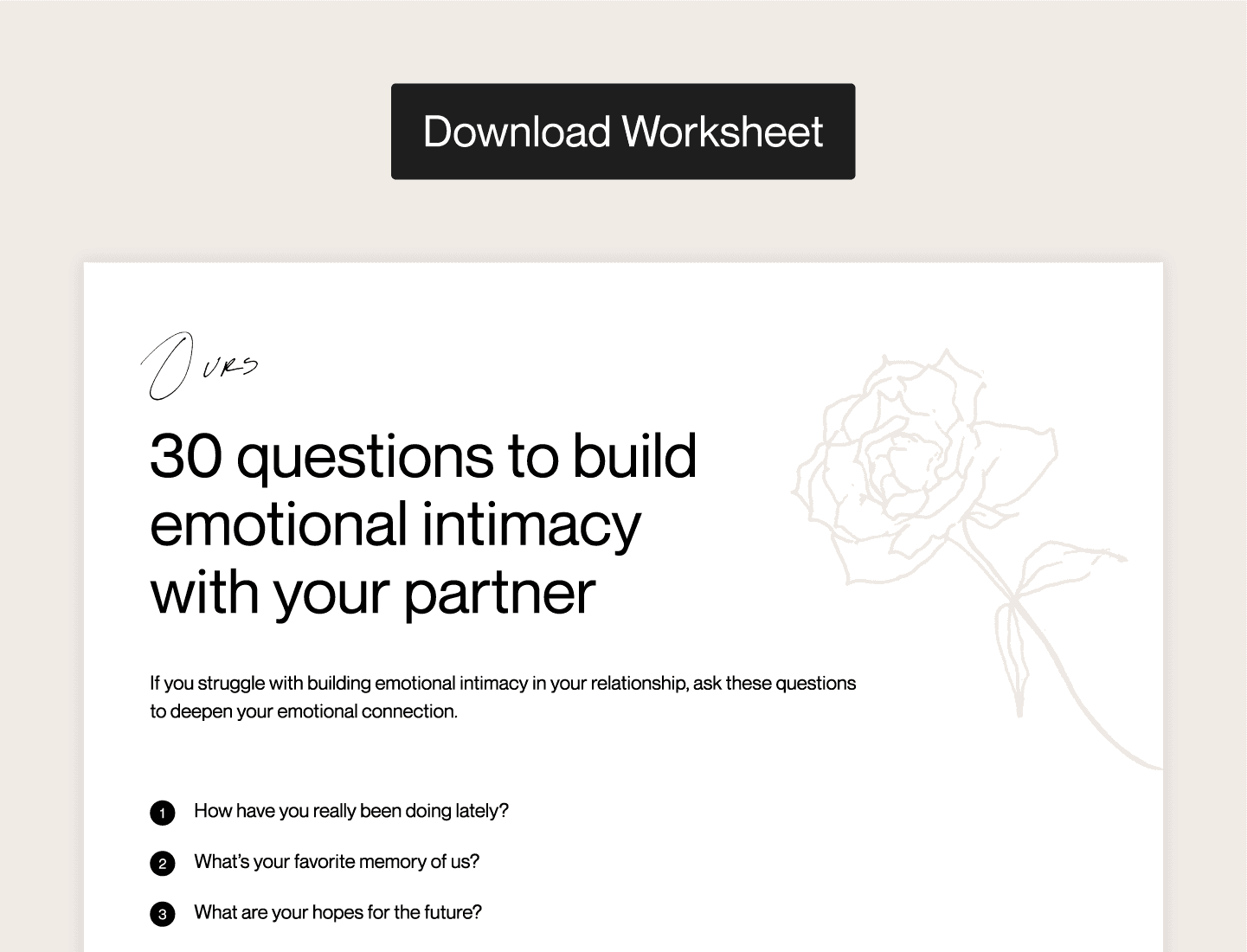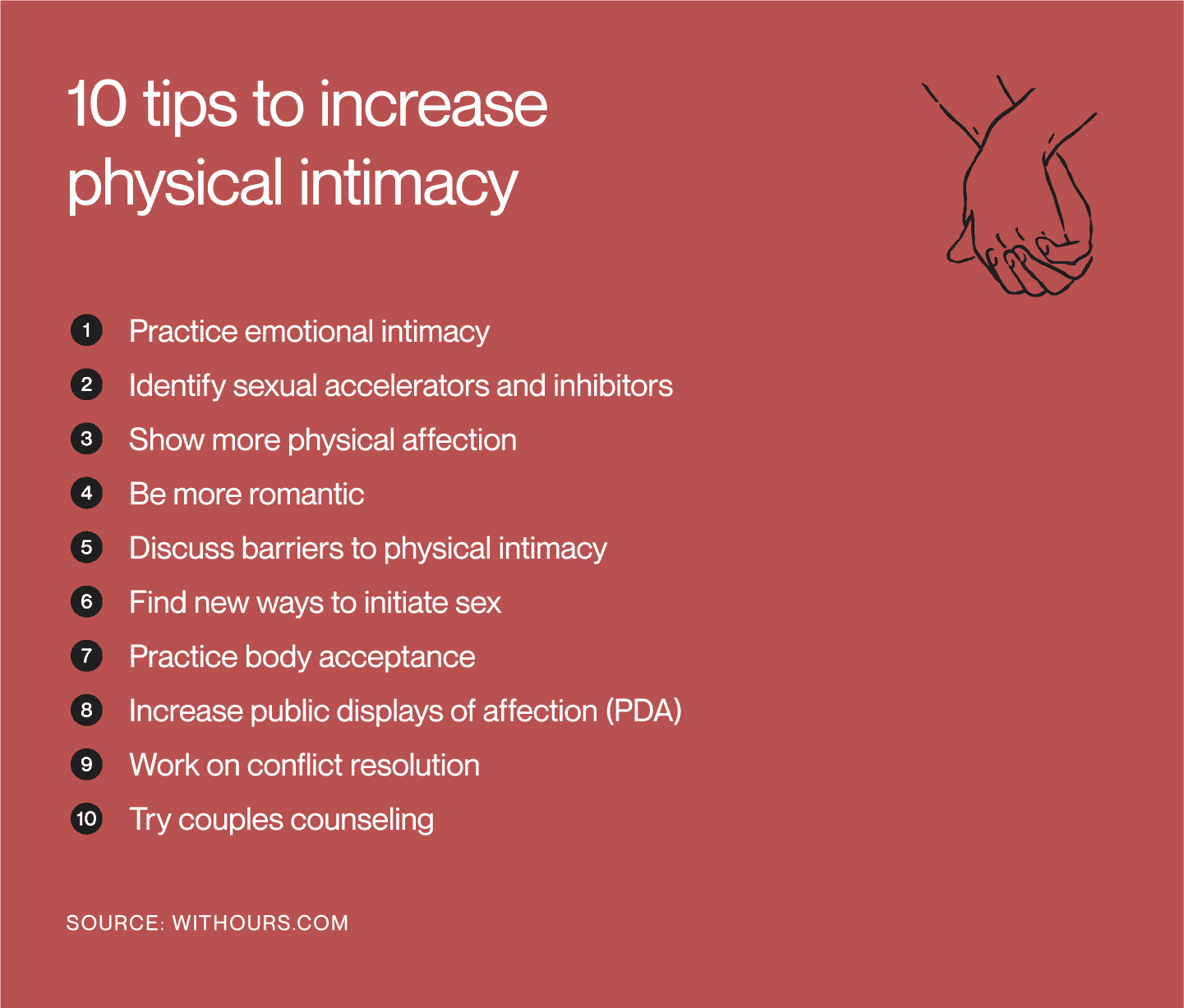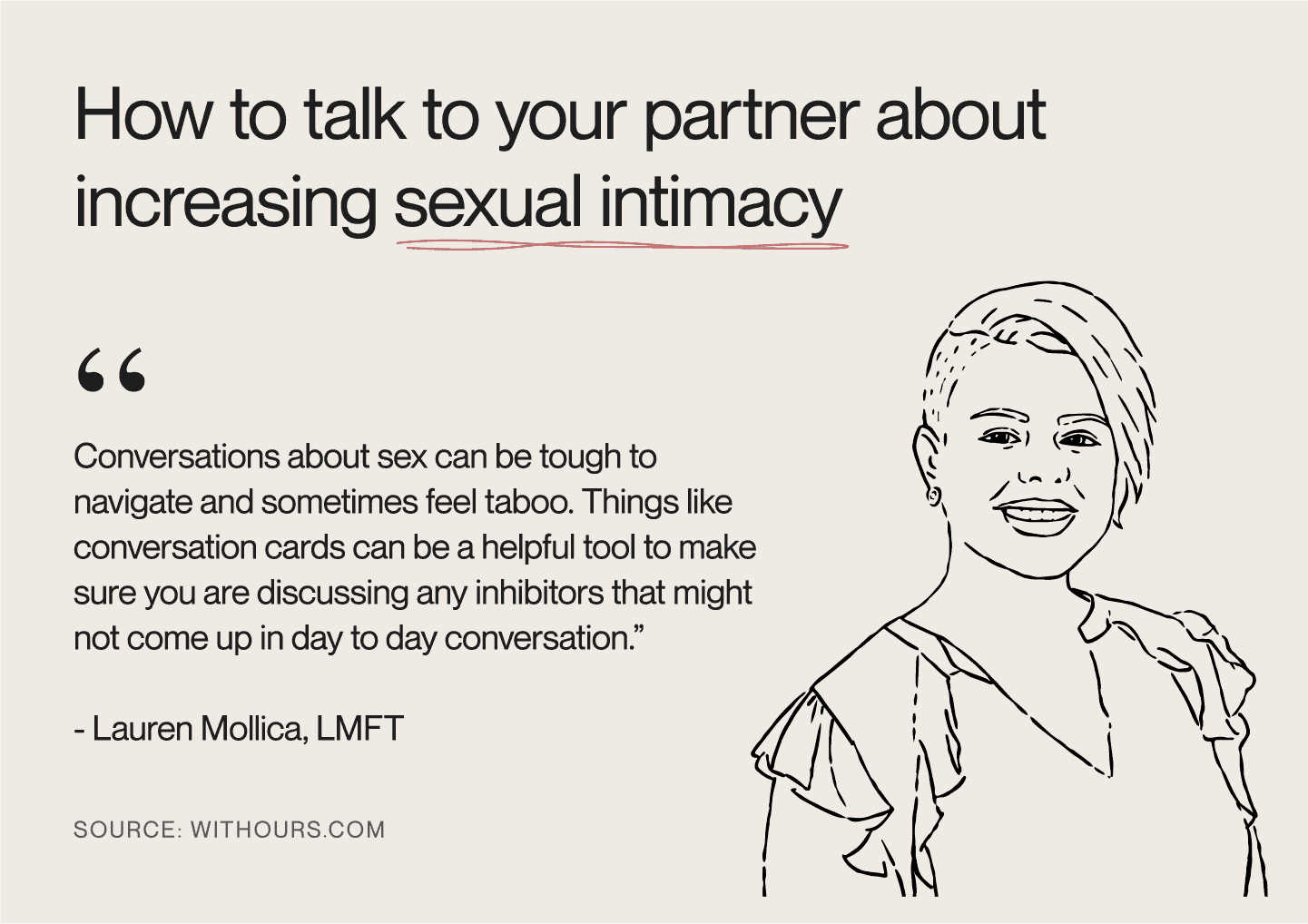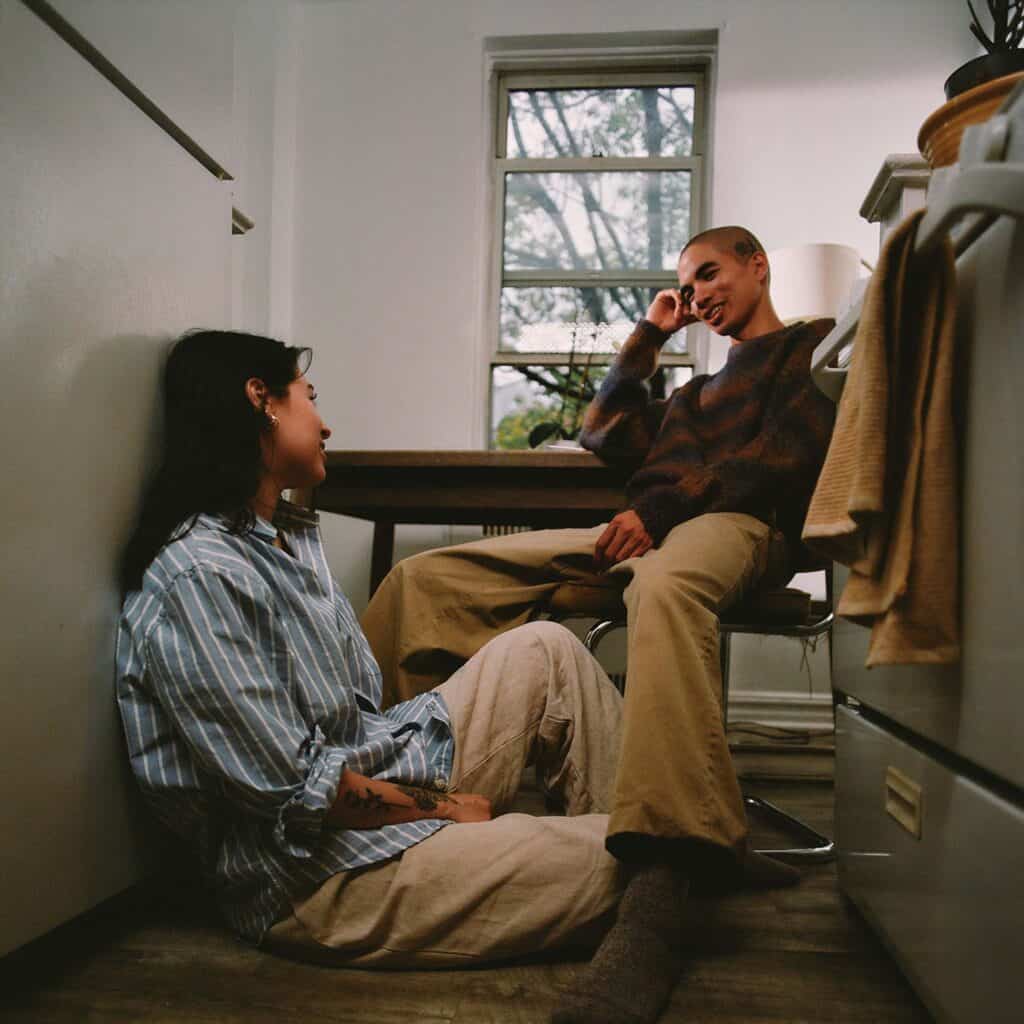Uncategorized
How to increase physical intimacy in a relationship: 11 ideas

contents
Physical intimacy is important in many relationships, but it ebbs and flows. Whether you’re looking to bring physical intimacy back or increase it in your relationship, there are simple ways for you and your partner to deepen your physical connection.
Being in love and in a relationship is beautiful, and it’s great to have someone there for your emotional needs. While emotional intimacy is important in every relationship, physical intimacy can be just as important. When we speak of physical intimacy, we’re talking about more than just sex.
The head of the Touch Research Institute at the University of Miami’s Miller School of Medicine, Tiffany Field, explains how important touch is. “What happens is you’re stimulating pressure receptors, and vagal activity increases … and with that, you get a decrease in cortisol, the stress hormone. There’s an increase in serotonin, which is the body’s natural antidepressant and anti-pain chemical. You get a decrease in Substance P, [which] senses pain.,” says Field.
Read on to learn how to increase physical intimacy in your relationship and more of its benefits.
What is physical intimacy?
Physical intimacy is any form of physical contact with the intent of forming a connection with another person. When you’re in a relationship, physical intimacy can take many forms. Sexual intimacy is a form of physical intimacy between romantic partners, but it’s much more than that.
There are many physical things to do in a relationship, including:
- Holding hands
- Cuddling
- Hugging
- Kissing
- Leaning on one another
11 physical intimacy ideas for couples
If physical intimacy is lacking in your relationship, there are many solutions. However, it’s also important to personally reflect on why you want to increase your physical intimacy. Whether you just want more physical touch or you’re trying to learn how to initiate sex with your husband or wife, it’s helpful to ask yourself why this is important to you.
Lauren Mollica, a licensed marriage and family therapist (LMFT) here at Ours, offers some great tips in addition to the 11 ideas.
“Explore why you want to increase physical intimacy with your partner. Are you having trouble connecting in other ways? Are you feeling societal pressure that you should be having sex a certain number of times a [month, week, or year]?”
-Ours therapist. Lauren Mollica, LMFT.
Lauren says we often don’t realize the ways society influences our expectations. “Take a moment to explore with your partner where your values align when it comes to this. Many times we might not be aware of [the] excess pressure that we experience because of societal standards,” she explains.
The following tips can help you and your partner if you’re looking to increase your physical intimacy.
1. Start with improving emotional intimacy
Emotional intimacy and physical intimacy go hand-in-hand. When looking to improve your physical intimacy, make sure you’re also trying to grow closer emotionally. That means being a good listener while also taking a deep interest in their thoughts and feelings.
Being emotionally intimate also means being there for your partner when they’re struggling. If you’re unsure how to support them, it can be as simple as asking, “What can I do to better support you?”
An emotional connection is also about being vulnerable and opening up about your own thoughts and emotions. Are you telling your partner you love and appreciate them? Do you open up when you’re struggling? Doing this can help you build emotional intimacy, which leads to more physical intimacy.

2. Have discussions about sexual accelerators and inhibitors
If you feel that there isn’t enough physical intimacy in your relationship, it’s important to have discussions about it. You may be in a situation where physical intimacy wasn’t a problem, but now it is. It’s possible something has changed or you both have different wants and needs.
For example, you and your partner may not be aligned on what gets you in the mood. We all have different “accelerators” and “inhibitors.” Accelerators are things your partner does that make you desire them, but inhibitors do the opposite.
“Identify what are your accelerators and inhibitors. Many times things that may be an ‘accelerator’ for your partner might be surprising to you. For example, taking chores off your partner’s plate might get things going in a positive direction,” says Lauren.
3. Show more physical affection
Couples can sometimes grow physically disconnected. If this issue arises, you can start reversing it by showing more physical affection in small ways.
- Hold your partner’s hand while watching shows
- Cuddle with them while you’re relaxing at home
- Rest your hand on their leg in the car
- Kiss goodbye as they leave for work in the morning
The possibilities are endless. Taking these small steps by increasing physical affection in small ways can make it start feeling more natural.
4. Be more romantic
When people come to marriage counseling, they often say that their partner isn’t as romantic as they were at the beginning of the relationship. It’s common for couples in long-term relationships to get caught up in a routine and forget the importance of romance in a relationship. This is especially true once you have kids and careers.
It’s great if you can schedule romantic date nights, but you can also be romantic in a variety of other ways. Something simple you can do is identify your partner’s love language and romance them that way.
The five love languages are:
- Positive affirmation
- Physical touch
- Gifts
- Spending quality time
- Receiving help
5. Discuss any barriers to physical intimacy
As mentioned, communication is important when trying to increase physical intimacy in a relationship, but some topics can be difficult to discuss. For example, maybe you or your partner’s sex drive is lacking due to issues you’re unaware of.
There are physical and mental health issues that can cause barriers to physical intimacy. Some of these may be:
- Depression
- Anxiety
- Hormonal changes
- Erectile dysfunction
- Past trauma
In many cases, it’s helpful to talk to your doctor about what’s going on. For mental health issues, you may need to work with an individual therapist. If you’re comfortable, discuss these barriers with your partner. It may also be helpful to meet with a virtual or local couples counselor who can help you navigate through these challenges.
6. Find new ways to initiate sex
Similar to how the routine of a relationship can hinder romance, it can also reduce the excitement of sex. You and your partner may both have busy lives with packed schedules, and even the act of making love may just feel like something else to add to your calendar.
To get out of this situation, try finding different ways to initiate sex. It can start by simply having conversations and understanding your partner’s desires.
If you’re taking the other steps, like building emotional intimacy, showing more physical affection, and understanding your partner’s accelerators, this is much more likely to help.
Here are some ways to initiate sex:
- Setting a romantic mood
- Sending sexy text messages
- Shower together
- Be playful
- Do it in the morning
- Have a code word
7. Practice body acceptance and respect
It’s difficult to practice physical intimacy if you feel judged about your body or if your partner feels judged about theirs. It’s sometimes easy to think, “Of course I find them attractive,” but sometimes, you need to verbalize it to your partner. Tell them they’re attractive and detail what you love about their body.
Intimacy insight: When you respect and accept your partner’s body in its entirety, there’s space for physical intimacy to grow.
This is also true when practicing body acceptance and respect for yourself. If you don’t feel confident about your body, it’s time to practice some body acceptance.
Regardless of how much your partner tells you how attractive you are, it’s difficult to receive if you don’t accept your own body. This takes work but is an important part of increasing physical intimacy.
8. Try increasing your PDA
We discussed how to show more physical affection, but this isn’t just limited to when you’re at home. Increasing your public displays of affection (PDA) is another way to increase physical intimacy. Showing more affection in public can lead to more physical intimacy at home.
It’s important to have conversations about this topic because some people feel uncomfortable with PDA. If you and your partner are into it, you can hold hands, hug, kiss, lean on each other, and anything else that brings you physically closer together.
9. Ensure sex is an intimate experience
If you’re looking to increase physical intimacy by having more sex, it has to be an intentional experience. When you make love half-heartedly, it doesn’t make the experience something to look forward to. Sex is both about experiencing pleasure as well as building a physical and emotional connection with one another.
A great way to do this is to be completely present in the moment by practicing mindfulness. The world-famous mindfulness teacher and researcher Jon Kabat-Zinn explains mindfulness as “awareness that arises through paying attention, on purpose, in the present moment, non-judgementally.”
If you have a busy mind, this can take some practice, but it’s worth it and will make the experience far more intimate.
10. Make sure your relationship is in a healthy place
It’s difficult to have physical intimacy in a relationship if you and your partner are regularly in conflict. If you and your partner have unresolved conflict, it can be an “inhibitor” preventing you from building a physical connection.
“If you don’t feel emotionally safe, it’s hard for your body to feel physically safe. We need to feel physically safe in order to enjoy a sexual experience.”
-Lauren Mollica, LMFT
If your relationship is lacking physical intimacy due to conflict, it’s good to start working on ways to resolve the conflict. There are many different communication exercises you can try as well as couples therapy worksheets.

11. Talk to a couples counselor
Marriage counseling is a great resource for couples who have hit a rough patch. Various therapies are available for couples who are stuck in conflict, like the Gottman Method. It helps couples resolve conflict and learn to manage it better in the future.
Work with a licensed couples therapist today
Why is physical intimacy important in a relationship?
Physical intimacy is important in every relationship because it makes us feel loved. We all want to feel attractive and desired as well. In addition to building a connection, research shows a wealth of other benefits.
In a 2021 study, researchers had participants recall an emotionally painful memory while holding their partner’s hand. They found that when experiencing emotional pain, holding a partner’s hand increased feelings of comfort.
Physical touch also increases oxytocin levels in the body. Oxytocin builds feelings of trust, romantic attachment, and sexual arousal. A Harvard Medical School says, “Just the simple act of touch seems to boost oxytocin release. Giving someone a massage, cuddling, making love, or giving someone a hug leads to higher levels of this hormone and a greater sense of well-being.”
Are physical and sexual intimacy different?
Physical intimacy and sexual intimacy are different. While physical intimacy can lead to sexual intimacy, it doesn’t have to. Being physically intimate with your partner can be done through simple acts like hugging, kissing, cuddling, and holding hands.
These actions build a stronger connection between you and your partner and are part of maintaining a happy, healthy relationship.
If your relationship is lacking sexual intimacy, Lauren recommends using conversation cards. These are cards that help with different topics, and you can make them related to sex.
Here are some example questions you could include in your conversation cards for sexual intimacy:
- What’s your favorite memory about us being intimate?
- What are three of your sexual accelerators?
- What does sexual intimacy mean to you?
- What is something fun you would like to try in the bedroom?

How couples counseling can help you increase physical intimacy
Increasing the physical intimacy in your relationship can be beneficial for the health of your relationship, but sometimes, couples hit a roadblock. If you’re struggling with physical intimacy in your relationship and it’s causing challenges, working with a qualified couples therapist can help.
Ours offers high-quality couples therapy, and you can do it from the comfort of your own home. We have a virtual platform and a team of licensed couples therapists who can help.
When you sign up, you fill out a questionnaire with some information about your relationship. We take it from there, and after a thorough review, we’ll hand-match you with the right therapist. If you’re ready to start increasing the physical intimacy in your relationship, sign up today.









